
 Cardionerds: A Cardiology Podcast
Cardionerds: A Cardiology Podcast 352. Case Report: The Culprit in the Pillbox – University of Kansas
CardioNerds (Dr. Amit Goyal) join Dr. Anureet Malhotra, Dr. John Fritzlen, and Dr. Tarun Dalia from the University of Kansas School of Medicine for some of Kansas City’s famous barbeque. They discuss a case of Hydroxychloroquine induced cardiomyopathy. Notes were drafted by Dr. Anureet Malhotra, Dr. John Fritzlen, and Dr. Tarun Dalia. Expert commentary was provided by Dr. Pradeep Mammen. The episode audio was edited by Dr. Akiva Rosenzveig.
Drug-induced cardiomyopathy remains an important and under-recognized etiology of cardiomyopathy and heart failure. Hydroxychloroquine is a disease-modifying antirheumatic drug used for various rheumatological conditions, and its long-term use is well-known to have toxic effects on cardiac muscle cells. Multiple cardiac manifestations of these drugs have been identified, the most prominent being electrophysiological disturbances.
In this episode, we discuss a biopsy-proven case of hydroxychloroquine-induced cardiotoxicity with detailed histopathological and imaging findings. We develop a roadmap for the diagnosis of hydroxychloroquine-induced cardiomyopathy and discuss the various differentials of drug-induced cardiomyopathy. We highlight the importance of clinical monitoring and early consideration of drug-induced toxicities as a culprit for heart failure.
“To study the phenomena of disease without books is to sail an uncharted sea, while to study books without patients is not to go to sea at all.” – Sir William Osler. CardioNerds thank the patients and their loved ones whose stories teach us the Art of Medicine and support our Mission to Democratize Cardiovascular Medicine.
US Cardiology Review is now the official journal of CardioNerds! Submit your manuscript here.
This episode is made possible with support from Glass.Health – The first digital notebook designed for doctors. Follow @GlassHealthHQ for the latest product updates!

Case Media – Hydroxychloroquine induced cardiomyopathy
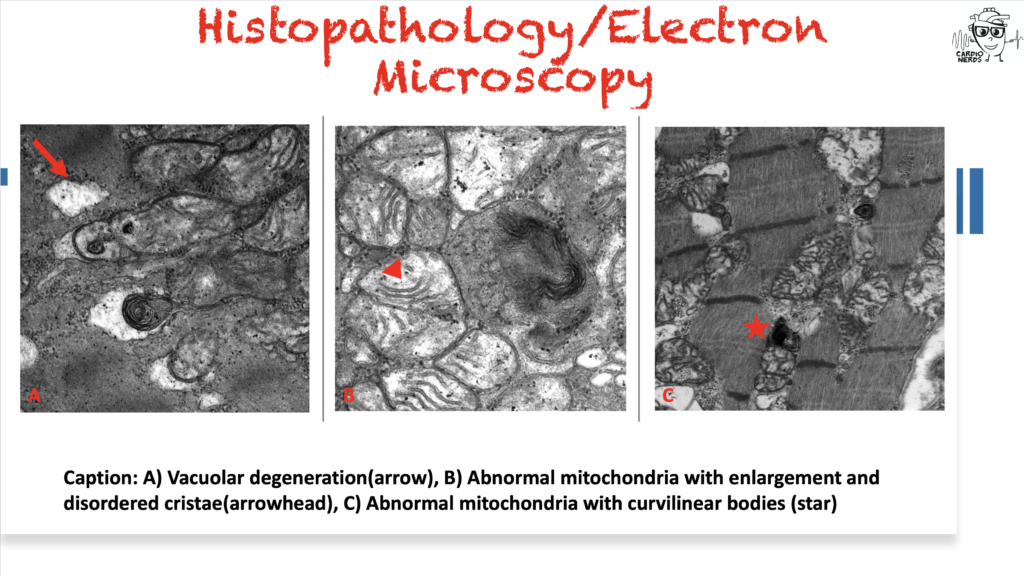
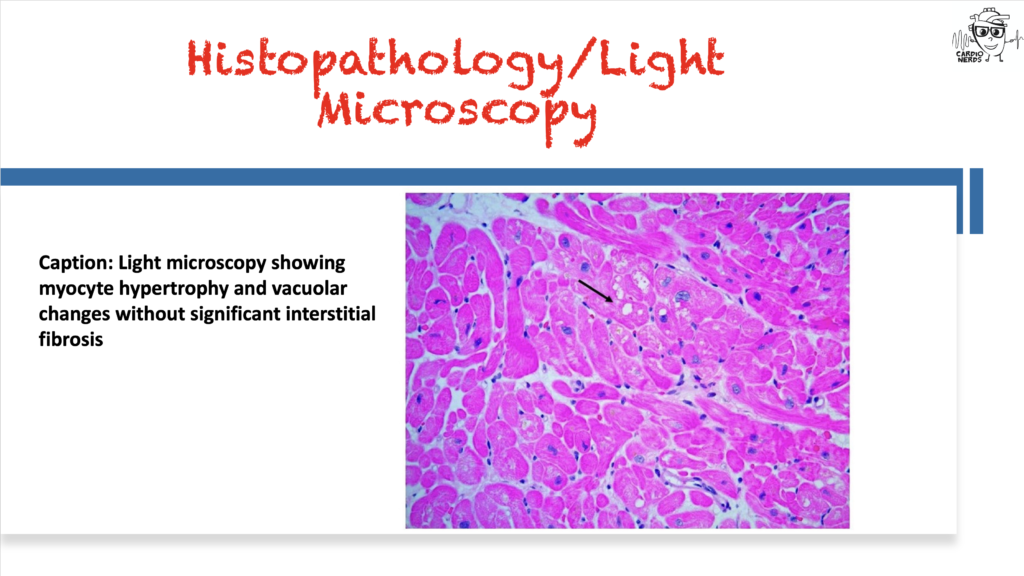
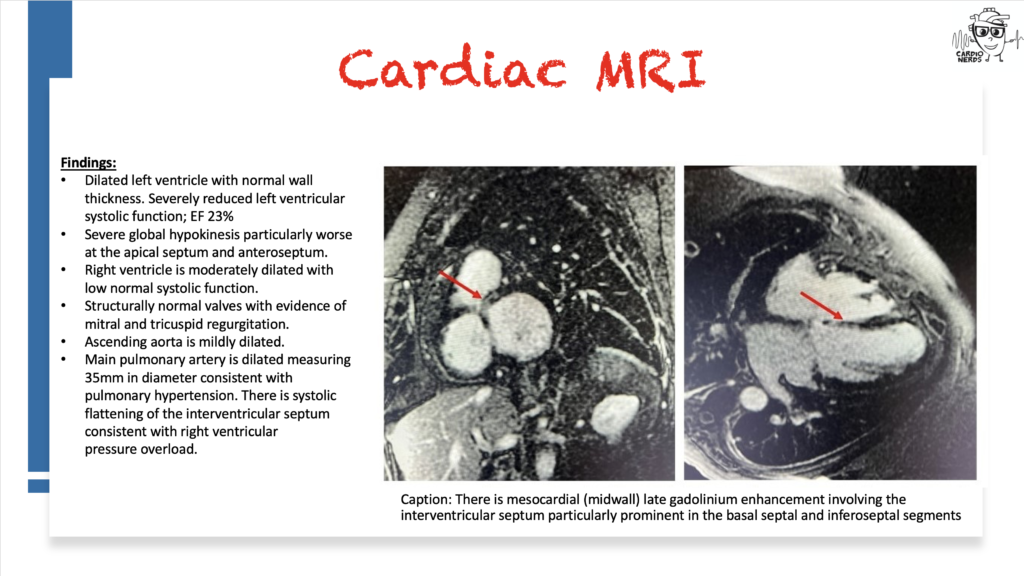
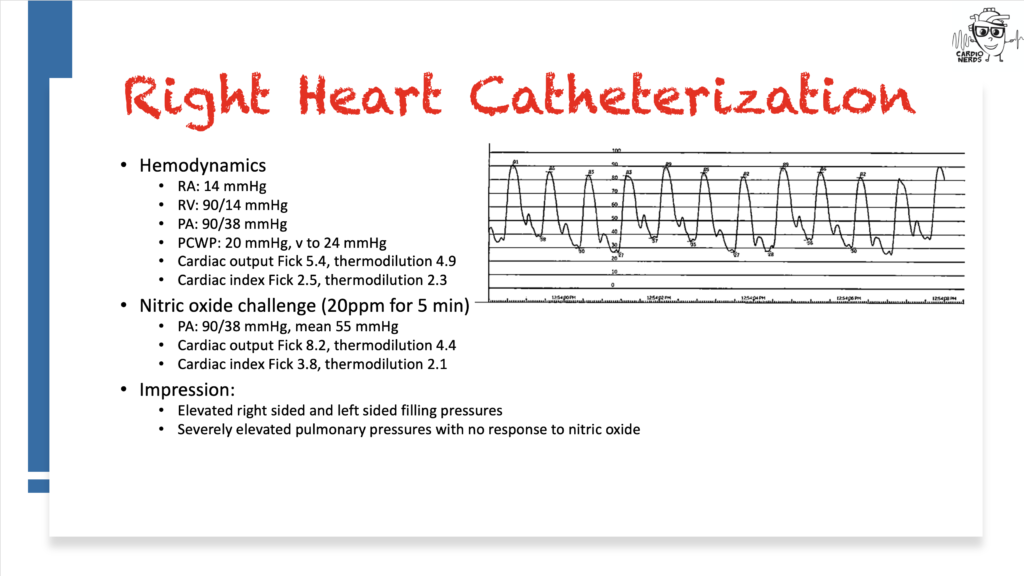
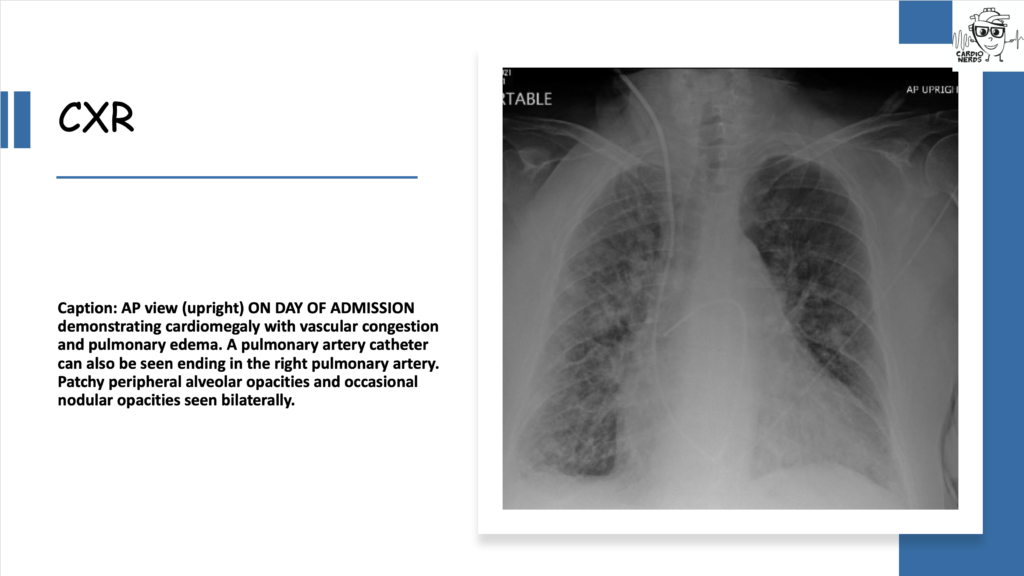
Pearls – Hydroxychloroquine induced cardiomyopathy
- Continued decline in left ventricular systolic function despite appropriate guideline directed medical therapy should prompt a thorough evaluation for unrecognized etiologies and warrants an early referral to advanced heart failure specialists.
- Transthoracic echocardiogram is a valuable non-invasive screening tool for suspected pulmonary hypertension, but right heart catheterization is required for definitive diagnosis.
- Cardiac MRI can be used for better characterization of myocardial tissue and can aid in the evaluation of patients with non-ischemic cardiomyopathy.
- Hydroxychloroquine (HCQ) is a commonly used DMARD that remains an underrecognized etiology of cardiomyopathy and heart failure. In addition to ophthalmological screening, annual ECG, as well as echocardiography screening for patients on long-term HCQ therapy, should be considered in patients at risk for cardiovascular toxicity, including those with pre-existing cardiovascular disease, older age, female sex, longer duration of therapy, and renal impairment.
- Management of hydroxychloroquine-associated cardiomyopathy consists of discontinuing hydroxychloroquine and standard guideline-directed medical therapy for heart failure. HCQ cardiomyopathy may persist despite medical therapy, and advanced therapy options may have to be considered in those with refractory heart failure.
Show Notes – Hydroxychloroquine induced cardiomyopathy
What are the various cardiotoxic effects of hydroxychloroquine (HCQ) and the mechanism of HCQ-mediated cardiomyopathy?
One of the most frequently prescribed disease-modifying antirheumatic drugs (DMARDs), HCQ is an immunomodulatory and anti-inflammatory agent that remains an integral part of treatment for a myriad of rheumatological conditions. Its efficacy is linked to inhibiting lysosomal antigen processing, MHC-II antigen presentation, and TLR functions.8 The known cardiac manifestations of HCQ-induced toxicity include conduction abnormalities, ventricular hypertrophy, hypokinesia, and lastly, cardiomyopathy.
- Conduction Abnormalities – by binding to and inhibiting the human ether-à-go-go-related gene (hERG) voltage-gated potassium channel, also known as Ikr channel, HCQ can lead to prolongation of corrected QT (QTc) interval. This can lead to an increased risk of drug-induced Torsades de pointes and other lethal ventricular arrhythmias.

- Cardiomyopathy – HCQ is a lipophilic drug that easily permeates myocytes and binds to lysosomal phospholipids, leading to lysosomal accumulation of phospholipids. Furthermore, by increasing the pH of the lysosome, HCQ inhibits lysosomal enzymes, which interferes with lysosomal function and exocytosis, leading to an acquired lysosomal storage disorder. This results in myofibrillar disorganization, atrophy, and fibrosis, which may lead to cardiomyopathy. Risk factors for the development of cardiotoxicity are thought to be pre-existing cardiovascular disease, older age, female sex, longer duration of therapy, and renal impairment. 8

- Extracardiac side effects – With long term use, HCQ can also lead to ocular toxicity, neuropathy, and myopathy with similar pathogenesis as cardiotoxicity, i.e., acquired lysosomal storage disorder.
What are the histopathological findings of HCQ induced Cardiomyopathy?
HCQ causes an acquired lysosomal storage disorder due to the inhibition of constitutive autophagy present in normal cardiac myocytes. On histopathology, this presents itself as cytoplasmic vacuoles, lamellar bodies and curvilinear inclusion bodies in cytoplasm that can be visualized with electron microscopy. Of these findings, curvilinear bodies are thought to be pathognomonic for HCQ induced cardiotoxicity. On histopathology, these findings can resemble inherited lysosomal storage disorders including Anderson- Fabry disease except for the presence of curvilinear bodies. 9
What is the differential diagnosis for HCQ induced cardiomyopathy?
Differentials of HCQ mediated cardiomyopathy include storage disorders like Fabry disease, adult-onset Pompe disease (acid maltase deficiency), and Danon disease. Many drug-induced myopathies such as amiodarone, rituximab, prednisone, cocaine, cobalt, and several chemotherapeutic agents can also resemble HCQ mediated cardiotoxicity.
Furthermore, amyloidosis, sarcoidosis and myocarditis also merit consideration as they can lead to restrictive physiology and present similar echocardiographic findings. They can be differentiated using advanced cardiac imaging such as cardiac MRI and histopathological findings on endomyocardial biopsy.
How can Cardiac MRI (CMR) assist in the work up of non-ischemic cardiomyopathy?
CMR can enhance visualization of cardiac structures that may be poorly seen on echocardiogram due to location or poor acoustic windows. CMR also uniquely provides detailed tissue characterization. CMR can be used for assessing many pathologies, including aortic disease, coronary artery disease, cardiomyopathies, pericardial disease, and congenital heart disease. 4 CMR is also considered the gold standard for assessing cardiac function and can be used to assess valvular pathologies with flow assessment.
Late gadolinium enhancement (LGE) refers to the discrimination of regions of scar, necrosis, or inflammation from normal tissue by the prolonged retention of gadolinium-based contrast agents. The pattern of LGE, as well as T1 and T2 mapping, aid in tissue characterization and accurate diagnosis. Key take-home points are as follows:
- The presence of LGE in a coronary distribution can support the diagnosis of prior myocardial infarction and aid in the assessment of myocardial viability.
- LGE in the mid-wall and sub-epicardium of the LV is characteristic of viral myocarditis. In addition, T1 mapping helps estimate the extracellular volume, and T2 weighted imaging can show myocardial edema in patients with myocarditis.
- In amyloidosis, the classic CMR findings include thick LV walls, valves, and interatrial septum and the presence of a pericardial effusion. They may also have the existence of amyloid protein in the myocardial interstitium associated with characteristic patterns of circumferential subendocardial LGE.

What is the management of HCQ induced cardiomyopathy?
- Diagnosis – HCQ cardiomyopathy diagnosis requires a high level of suspicion. A detailed history is an essential first step. CMR can aid in tissue characterization and is a helpful non-invasive tool. Definitive diagnosis can be established by obtaining an endomyocardial biopsy, given its distinctive histopathological findings, and ruling out close mimics of HCQ-induced cardiotoxicity.
- Treatment – the potentially reversible nature of HCQ cardiomyopathy makes early diagnosis and discontinuation of the offending drug the mainstays of treatment along with guideline directed medical therapy for heart failure. Recovery is variable and may take months or even years for LV function to improve. In some cases, there may be partial or no recovery, requiring advanced therapies evaluations.
References – Hydroxychloroquine induced cardiomyopathy
- Greiner S, Jud A, Aurich M, et al. Reliability of Noninvasive Assessment of Systolic Pulmonary Artery Pressure by Doppler Echocardiography Compared to Right Heart Catheterization: Analysis in a Large Patient Population. Journal of the American Heart Association.2014;3(4).10.1161/JAHA.114.001103
- Augustine DX, Coates-Bradshaw LD, Willis J, et al. Echocardiographic assessment of pulmonary hypertension: a guideline protocol from the British Society of Echocardiography. Echo research and practice. 2018;5(3):G11-G24. 10.1530/ERP-17-0071
- Page RL, O’Bryant CL, Cheng D, et al. Drugs That May Cause or Exacerbate Heart Failure. Circulation. 2016;134(6).https://doi.org/10.1161/CIR.0000000000000426
- Kramer CM. Role of Cardiac MR Imaging in Cardiomyopathies. Journal of Nuclear Medicine. 2015;56(Supplement_4):39S45S.10.2967/jnumed.114.142729.
- Joyce E, Fabre A, Mahon N. Hydroxychloroquine cardiotoxicity presenting as a rapidly evolving biventricular cardiomyopathy: key diagnostic features and literature review. European Heart Journal Acute Cardiovascular Care. 2013;2(1):77-83. https://doi.org/10.1177/2048872612471215
- Ezzeddine FM, Giudicessi JR, Maleszewski JJ, Lin PT, Borlaug BA, Geske JB. Unmasking Hydroxychloroquine Cardiotoxicity in a Patient With Heart Failure and Chronotropic Incompetence. JACC: Case Reports. 2021;3(7):997-1001. https://doi.org/10.1016/j.jaccas.2021.03.003
- Humbert M, Kovacs G, Hoeper MM, et al. 2022 ESC/ERS Guidelines for the diagnosis and treatment of pulmonary hypertension. European Heart Journal. Published online August 26, 2022. https://doi.org/10.1093/eurheartj/ehac237
- Bansal P, Goyal A, Cusick A, et al. Hydroxychloroquine: a comprehensive review and its controversial role in coronavirus disease 2019. Annals of Medicine. 2020;53(1):117-134. 10.1080/07853890.2020.1839959.
- Roos JM, Aubry MC, Edwards WD. Chloroquine cardiotoxicity: Clinicopathologic features in three patients and comparison with three patients with Fabry disease. Cardiovascular Pathology. 2002;11(5):277-283. https://doi.org/10.1016/s1054-8807(02)00118-7

